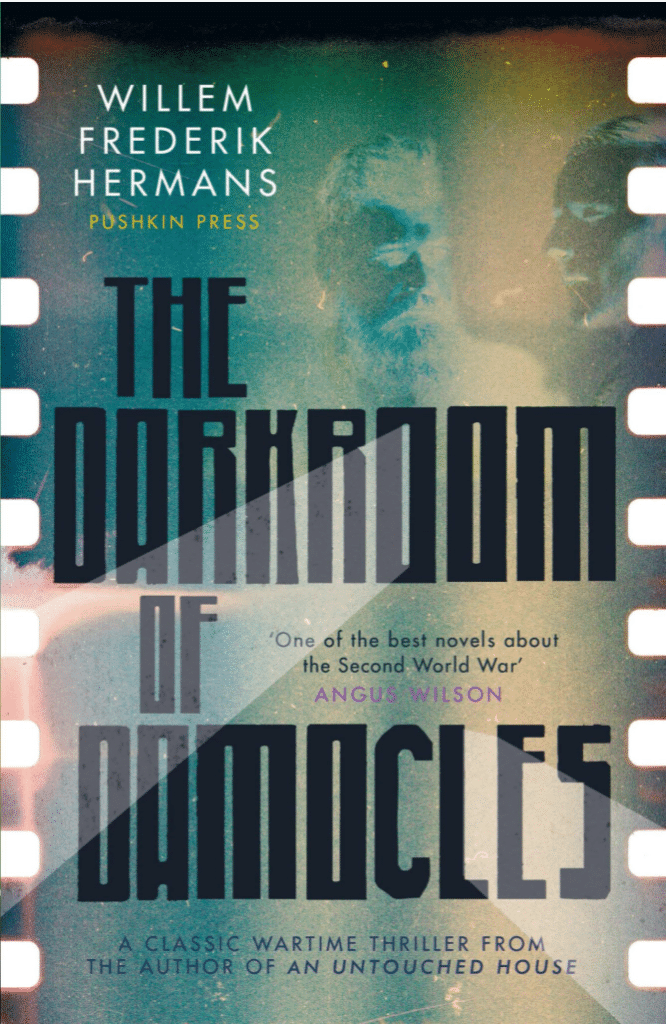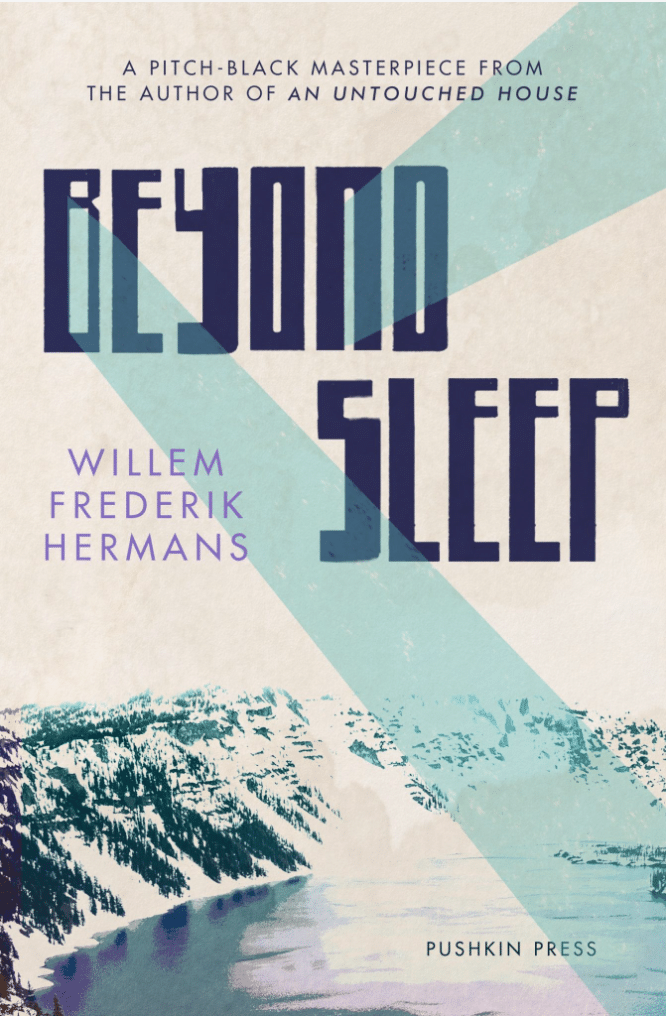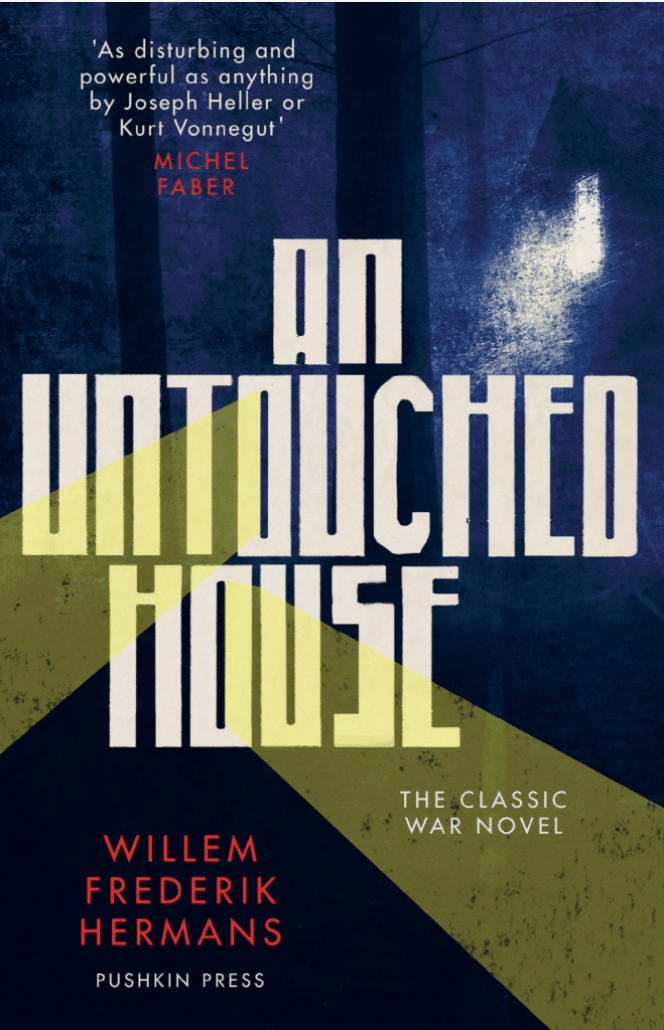The Unrelenting World-Picture of Writer Willem Frederik Hermans
Willem Frederik Hermans (1921-1995) is considered one of the three most important authors in the Netherlands in the postwar period, along with Harry Mulisch and Gerard Reve. Writer and former publisher Henk Pröpper first came into contact with adult literature through The Dark Room of Damocles, one of Hermans’ best-known books. After re-reading his work, Pröpper concludes that his novels have lost none of their value. ‘I could now see much more strongly how black Hermans’ world-picture and vision of society are.’
I must have been fourteen or fifteen when I informed my mother that I had now read all of juvenile literature. The school library I had exhausted; the bookshelves at home I had already utterly devoured. I had even read my father’s books, admittedly numerous but with only a single theme: the Second World War. Some of them romanticised stories, but mainly books with hard facts and analyses. I had seen the photos of mass graves and executions, the man looking into the camera lens, on his knees on the edge of a pit full of bodies; beside it a German soldier in uniform with his collar undone, holding a pistol to the man’s neck.
It was time, I must have thought, for me to be initiated into a different world, one that would be able to tell me where these facts came from. One that could put me on the track of what I must then have called the incomprehensible and what later would be called the absurd. That open gaze, that open collar.
In reading I found depictions of worlds where superhuman courage and exertions brought salvation
Reading had always been my greatest joy, because in it I found the impulses of an immense, positive imaginative power, depictions of worlds where superhuman courage and exertions brought salvation. If something nibbled away at that round world where everything would be all right in the end, that would admittedly lead to a certain amount of distress, but a distress that provided insight. Pain in small doses, like the small doses of aspirin children are given to ‘make them well’.
I expected a lot from literature without knowing precisely why. Without knowing the words, without the vocabulary to name characteristics of literature, I must even have thought that literature would be able to describe a world with many layers – no longer one-dimensional, no longer rose-tinted, no longer exclusively factual. I must also have associated with literature something wild, some fumbling understanding – a residue of my childhood reading here, certainly – and also a link to the dream that can throw light on incomprehensible things.
 Willem Frederik Hermans (1921-1995)
Willem Frederik Hermans (1921-1995)Collection Letterkundig Museum, The Hague.
Interpretation, attaching significance, insight – my mother must have sensed my longing for all this. She said to me: ‘If you want to read literature, you must read this book.’ And she handed me The Dark Room of Damocles (De donkere kamer van Damokles) by Willem Frederik Hermans. She gave me no further instructions. Teacher of Dutch literature though she was, she did not introduce the book. She evidently relied on my being able to digest it. Even so, it must have been something of a solemn moment for her, given that I had so clearly asked for literature and literature was her one great passion. While the Bible was daily subjected to exegesis, my initiation into the universe of Hermans and of literature was left to the gods.
She was wise to do so, and I am eternally grateful to her for that. From that day on, literature for me has been bound up with my baptism in the dark waters of Hermans. And that was precisely the insight I gained – that immersion in murkiness and darkness can be a kind of blessing. Hermans gave me the black enigma, the strange beauty of the absurd.

I recall that not long afterwards it was my turn to give a talk at school. I talked about Hermans and The Dark Room of Damocles, and I felt I had spoken long and passionately. The words flowed as if I were some St Paul with a revelation to make. I wanted, I think, to make comprehensible that there are things that are incomprehensible and that you can write them down, present them, in such a way that this vagueness can nevertheless be a kind of insight. A complicated story, in short, that was presumably fairly incomprehensible and at most gripping because of my passion. But what interests me here is that very enthusiasm, not so much the apostolic nature of it, the desire to bring others to a higher level of understanding, or to describe the unknowable, but more the pure passion that can arise out of a text, a story.
Several of Hermans’ novels have had the same effect on me that my chemistry set briefly had. A successful experiment led to the highest degree of satisfaction, a heady brew of overweening confidence and humility. To the realisation that a tiny step had indeed been taken towards fathoming the nature of matter, but also that matter was infinite, infinite like the world of literature, of stories.
A perfectly executed gymnastic exercise
Until recently works by Willem Frederik Hermans were not, or hardly ever, translated. A whole host of minor, specific reasons lie behind this. Recently, however – to my great satisfaction – translations have appeared in Germany, France, England, Italy and other countries, so we may assume that all sorts of other translations will soon follow. Because of the nature of my work, in the last few years I have spoken often and a great deal about Hermans, but I did so on the basis of reading done long ago, by the young man with the chemistry set. It has constantly struck me with what passion – and how effectively because of that – I have spoken. At the same time, I have felt more and more strongly that my stories were a representation in themselves, reflections of dreamed books, so to speak. And I have asked myself whether that representation and perception would survive re-reading, whether they were at all in accordance with the novels as I would read them now after so many years. Or whether I would be reading completely new books that had little in common with the reading done by a young man.

While reading, re-reading, over these past months, I was constantly reminded of the definition of ‘classic’ given by Jorge Luis Borges. What, in his view, is a classic work? ‘A classic is a book which is read in a country or group of countries over a fairly long period of time as if everything in it is well-considered, fatal and profound as the universe and lends itself to endless interpretations. (…) A book is not a classic (I repeat) that in itself possesses these or those particular merits; it is a book that generations of people, impelled by a variety of reasons to do so, read with determined enthusiasm and with a mysterious loyalty.’
This definition fits in every respect the small exercise I have just completed. I have re-read The Tears of the Acacias (De tranen der acacia’s, 1949), I Am Always Right (Ik heb altijd gelijk, 1951) and The Dark Room of Damocles (De donkere kamer van Damokles, 1958). Strangely enough, after so many years I recognized practically everything, especially in The Dark Room of Damocles, the first one I read when young. Whole sentences and passages seemed engraved in my memory – it was as if I was mumbling them as I read. However impenetrable the plot, that very impenetrability constitutes the core of the book, which again seemed to me perfectly well-considered and fatal, qualities that are Borges’ criteria for a classic work. At the same time the novels were totally new, totally fresh to me, especially because of the ideas, the intense political consciousness and the razor-sharp analyses of human behaviour, most of which had escaped me before. It was as if I was two generations at one and the same time, looking over my own shoulder with fatherly approval.

The earlier reader (myself as a young man) read with constant enthusiasm deeply experienced texts, almost as if they were poetry, quivering with tension and significance; the later reader (me at a more advanced age) read stories that far transcended their historical context and specific subject and were extremely topical and gripping. Many of the analyses of social, political and geopolitical developments now seemed to possess an almost prophetic force, the strange inevitability that can only manifest itself so strongly in novels, so that they seem to anticipate real historical developments. In Dutch literature that can be said of such works as Max Havelaar (1860) by Multatuli, The Body Mystic (Mystiek lichaam, 1986) by Frans Kellendonk – and certainly to this trio of novels by Willem Frederik Hermans as well.
The thrill of his stories lies not only in the action but also – and especially – in the sentences and ideas
What remained on re-reading was my amazement at the incredibly high-voltage charge of these stories. They are uncommonly thrilling, and the thrill lies not only in the action but also – and especially – in the sentences and ideas. Even in the casual way in which – no matter how enigmatic they sometimes are – they have been committed to paper. They are like a perfectly executed gymnastic exercise. Control, however, has to be maintained until the very end. And the series of movements that the body and the world show in constantly changing (and dangerous) relationships has to be followed by a faultless jump off and landing. And what if there is an abyss where the jump off should be? That question is always there under the surface.
In those days, I was mainly obsessed by the idea that the world is a slippery place where you can never be certain of your life, where your name and identity are interchangeable and offer no certainty that you will be recognised. Where a young man, and many others, seek recognition throughout their lives, Hermans – like Roland Topor in his drawings – presents situations where the self-evident nature of the recognition is undermined. Who are you really when you are not recognised and are taken for someone else? How long can you go on believing that you are who you think you are when no-one else recognises you as such?
What if others insist on considering you a bad person – how straight is the path you are following? In other words, do you determine your own course in life, or are you driven by all sorts of unconscious (dark) longings or, even worse, by outside mechanisms over which you have no control?
Should you happen to believe in the good in life, reading Hermans’ works is a sobering experience
In my recent reading, that personal and psychological dimension turned much more into a general and philosophical one. I could now see much more strongly how black Hermans’ world-picture and vision of society are. Should you happen to believe in the good in life, reading these works is a sobering experience. One character blandly remarks to another: ‘You think that people will be good to you if you are good to them.’ A sentence like that pulls the rug from under somebody’s feet – and uncommonly effectively too. A remark like that gives food for serious thought, but it also concentrates the mind, induces a kind of strange level-headedness that is always the residue of such literature.
Reading these works offers you the possibility of starting again, from scratch, with a clean slate which in turn also gives you space. Credulity leads to nothing – you have to keep starting afresh if you are to get anywhere. Little in Dutch literature so openly – and with so little support for our egalitarian way of thinking – defines stupidity and sentimentality as disastrous qualities. How do you stay upright in a cold world where everything heats up for only a short while, like passion in the company of a whore? – to use an image that fits Hermans’ writing well. Many of his characters choose to lie, but only extremely intelligent liars master that art. Most liars do not even know why they lie. They allow themselves to be led by circumstances, but choose the easy way out, which often leads to their ultimate downfall. Nothing is more characteristic of a weakling in Hermans’ work than the incapacity to lie convincingly.
The yearning for a critical sense
Unlike the comparable author Houellebecq, Hermans’ black is in high relief, surprising the reader time and again with the nakedness and naturalness of his language. By the headstrong, ruthless humour, too, the immense enjoyment with which even deeper shades are found in the black. When characters talk to each other, it is often, as with Arnon Grunberg (writer of a.o. Blue Mondays – Blauwe maandagen, 1994), to provoke or mislead each other, rarely to communicate or share anything.
In Hermans, words can almost literally kill. His characters speak the words that certainly come into people’s minds, but seldom pass their lips – that is an almost theatrical convention in his work. Our amazement at the deadly precision of one utterance has not yet passed when another faultlessly expressed formula follows it, and yet – and that is the remarkable thing – the sentences appear to be completely realistic. Hermans’ work never gives the impression of being artificial or devised – it is like some natural phenomenon. A storm against which you can pit yourself and from which you emerge as if reborn, honed, ready to do battle and hopefully achieve something.

Hermans is not a belletrist, a striving for beauty is confined to his slimier characters. He appears to have a highly developed sense of ugliness. No one describes a person’s physical appearance so mercilessly as he does (or as his characters do), and seldom have sexual acts been so inept and human relationships so grubby as in his stories. With the patina of ugliness that he lays over the world, Hermans is able to make the atmosphere of the German Occupation (1940-1945) palpable – the corruption, the fear, the self-interest, the often unclear relations and actions of people. He faultlessly describes the twilight zone in which heroes and collaborators are to some extent interchangeable. That is not a cheerful science. The inadequacy of human thought and action in crisis situations is immense, the rare good impulses are scarcely noticed if at all.
Many of his visions and analyses only have a cheerful feel to them because of their aptness. ‘In the present age good manners are only a form of clumsiness. Modesty now means an inferiority complex,’ the main character muses in I Am Always Right – nineteenth-century attributes, then, which in the present age (the late 1940s) get you absolutely nowhere. They are even dangerous, as attributes that stamp you as not being of the present age and as a weakling.
Hermans’ work never gives the impression of being artificial or devised – it is like some natural phenomenon
In The Dark Room of Damocles
an SS man speaks to the main character in the selfsame way: ‘Take Dostoevsky. In Dostoevsky you’ll find people who are gentle, kind, high-minded, generous, saintly – but they’re all mad, every one of them. That’s what it boils down to! Man is only good out of calculation, insanity, or cowardice.’ He then expounds a whole theory about the developments humanity can expect after the Second World War. ‘Persecution of Jews? You mark my words! In twenty years’ time the British, the Americans and the Russians will have the Jews exterminated by the Arabs, if it happens to suit them. (…) Or they’ll have the Arabs exterminated by the Jews, if that makes you feel any better!’
From whom is any form of salvation to be expected in such an amoral world? From intellectuals? The SS man just quoted calls himself an intellectual, an amoral theorist. From politics? The novel I Am Always Right contains hilarious scenes about the setting up of a political party:
‘My aim is this: I want to set up a political party, a new party. You are to be its intellect.’
‘There are a hundred and twenty-eight political parties in the Netherlands.’
‘That’s because the intellectuals do not believe in good ideas either. Which means that only morons set up political parties. That’s why only moronic things are done in Dutch politics. But that must stop. I want to set up a party that puts an end to it.
And you’ve got to help. You can stir up the masses.’
This passage faultlessly exposes the almost natural division between politics and the intelligentsia. For why is our main character’s intellect so vital to this new party? Not for his good ideas, but to stir up the masses (an exceptionally acute analysis of modern politics). Does this excuse intellectuals from their duty to participate and implement their good ideas and insights? No, certainly not. More powerfully than romantic, idealistic stories, the cold, meaningless world of Hermans implants in us the yearning for a critical sense, for nineteenth-century courtesy and insane goodness, for razor-sharp analyses that do not bend to comply with the general mood. Books like this you can certainly give to a child.
The excerpts from ‘The Dark Room of Damocles’ have been translated by Ina Rilke.
The novels of W.F. Hermans have been translated many times into English. You can be found the titles in the database
of the Dutch Foundation for Literature and Flanders Literature.
This article first appeared in the 2007 edition of our yearbook The Low Countries № 15, pp. 218-226





